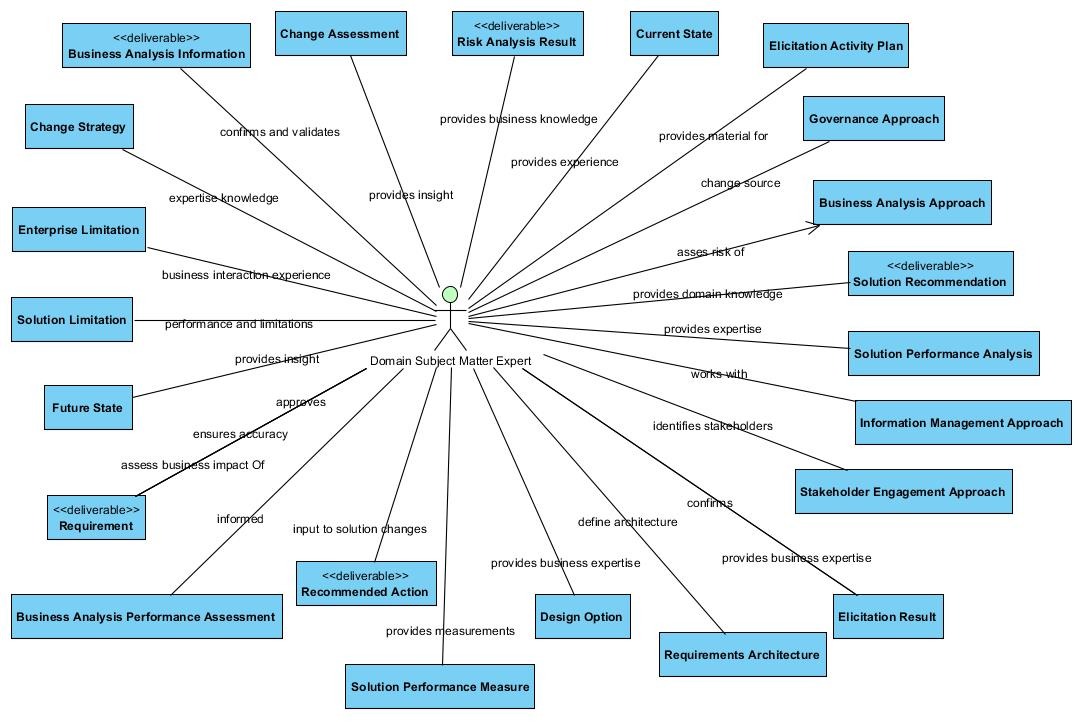Domain Subject Matter Expert
People with in-depth knowledge of a topic relevant to the business need or solution scope. This role is filled by individuals who have in-depth knowledge of the solution such as end users, managers, process owners, legal staff or consultants.


BABOK References
This is a list of references to domain subject matter experts in the BABOK:
May help to identify stakeholders and may themselves be identified to fulfill one or more roles on the initiative.
Can be a source of risk when their involvement is required and availability is lacking. The approach taken may
Depend on availability and level of their involvement with the initiative.
May be a possible source of a requested change or may be identified as needing to be involved in change discussions.
May need to access and work with business analysis information, and will be interested in a more specific view of business analysis information which relates to their area of expertise.
Should be informed about the business analysis activities in order to set expectations regarding their involvement in the work and to elicit their feedback regarding possible improvements to the approach.
Provides supporting materials as well as guidance about which other sources of business analysis information to consult.
May also help to arrange research, experiments, and facilitated elicitation.
Provides input into how to change the solution and/or the organization in order to increase value.
Provides input into how the organization interacts with the solution and identifies potential limitations.
Provides input into how the solution should perform and identifies potential limitations to value realization.
Can identify risks and provide insights into data for analyzing solution performance.
A person familiar with the domain who can be consulted to provide potential measurements.
May be called upon for their domain knowledge to assist in analyzing potential value and benefits, particularly for
Those requirements where they are harder to identify.
Provides the expertise within the business to provide input and feedback when evaluating solution alternatives, particularly for the potential benefits of a solution.
May assist in defining and confirming the requirements architecture.
Provides input into how the organization interacts with the solution and identifies potential limitations.
Provides input into how the solution should perform and identifies potential limitations to value realization.
Can identify risks and provide insights into data for analyzing solution performance.
A person familiar with the domain who can be consulted to provide potential measurements.
May assist in defining and confirming the requirements architecture.
Provides the expertise within the business to provide input and feedback when evaluating solution alternatives, particularly for the potential benefits of a solution.
May be called upon for their domain knowledge to assist in analyzing potential value and benefits, particularly for those requirements where they are harder to identify.
Have expertise in some aspect of the change.
Provides input to the risk assessment based on their knowledge of preparation required in their area of expertise.
Provides insight into current state and potential future states.
May have recommendations regarding the set of requirements to be linked to a solution component or to a release.
Has expertise in some aspect of the situation and can provide insight into how the change will impact the organization and value.
May be involved in the review and approval of requirements and designs as defined by stakeholder roles and responsibilities designation.
Provides supporting materials as well as guidance about which other sources of business analysis information to consult.
May also help to arrange research, experiments, and facilitated elicitation.
Has expertise in some aspect of the situation and can provide the required business analysis information.
Often guides and assists the business analyst in identifying appropriate research sources, and may help to arrange research, experiments, and facilitated elicitation.
People with substantial knowledge, experience, or expertise about the business analysis information being elicited, or about the change or the solution, help to confirm that elicitation results are correct, and can help to identify omissions, inconsistencies and conflicts in elicitation results. They can also confirm that the right business analysis information has been elicited.
Needs to understand the business analysis information as part of confirming and validating it throughout the change initiative.
May be a possible source of a requested change or may be identified as needing to be involved in change discussions.